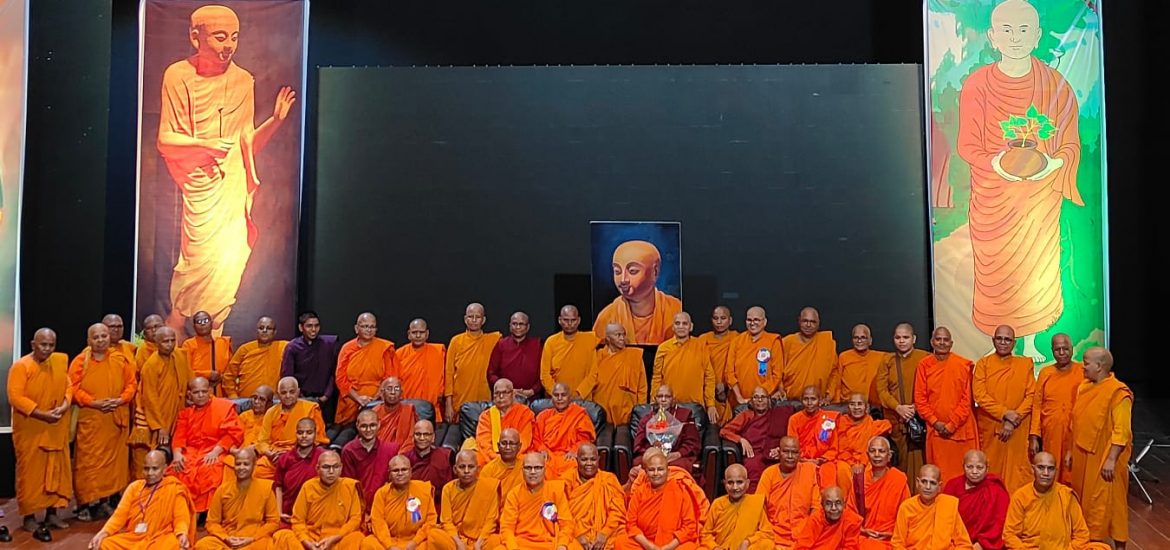29 and 30 September heralded Bhadrapada Purnima, which according to the lunar calendar this year marked the day Majaprajapati Gautami, the Buddha’s stepmother, founded the bhikkhuni sangha. Over these two days, Mahaprajapati Gautami Educational Foundation marked the occasion by holding International Bhikkhuni Sangha Day at the CIDCO Auditorium, inside the convention and exhibition center in Navi Mumbai, Maharashtra. International Bhikkhuni Sangha Day had more than 800 attendees, including delegates from all over India and with a majority of lay participants coming from Mumbai.
On the 29th, the program began with a morning rally holding Buddhist flags. The rally began at the Buddhist temple of Buddha Pratishthan, with more than 75 bhikkhunis coming from various parts of India, along with local laypeople leading the rally. Monastics, male and female, were honored and welcomed with a lotus bud as they reached the convention centre.
The inaugural session also welcomed chief guest Dr. Amrit Pal Kaur and special guests Ven. Seelachara Bhikkhuni, Ven. Katyayni Bhikkhuni, Ven. Pannya Silo Bhikkhu, and Ven. Mouriyar Buddha. Ven. Suniti Bhikkhuni spoke as organiser of the event. Together, the guests lit an electric candle to symbolically mark Atta Deep Bhava and unveiled a painting of Mahaprajpati. Ven. Thulnanda Bhikkhuni conducted the tri sharan and panchsheel chanting in Pali, while Ven. Nimmal Metta Bhikkhuni gave the same in Hindi on requests made by laywomen of Mahila Metta Sangha from Seawoods.
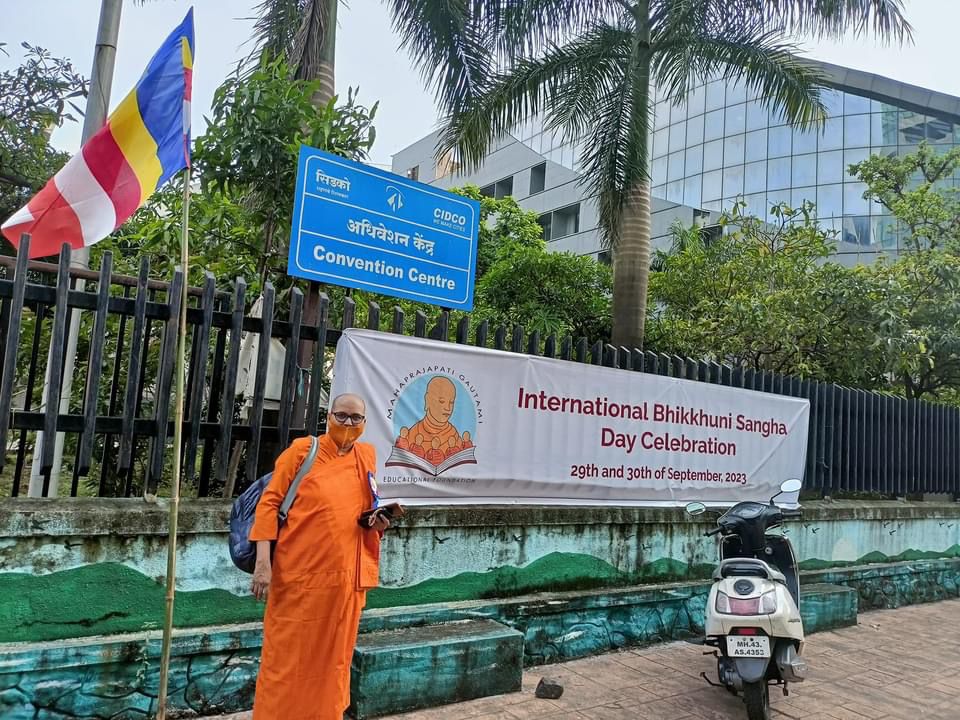
The welcome song, in tribute to Mahaprajapati Gautami and the bhikkhuni sangha, was sung by Upasika Usha Boudha. Ven. Vijaya Maitriya Bhikkhuni gave the introductory speech and discussed the history and present situation of the bhikkhuni sangha in India. A performance by “We The People,” a local performing group, welcomed the guests with a Koli folk dance based on a song that reclaims Agri-Koli communities’ association with the historical Koliy clan, the ancient tribe of Mahamaya and Mahaprajapati (the Buddha’s mother and stepmother were sisters).
There were discussions around how Ambedkarites see India’s historical and current context. For example, Ven. Pannya Silo Bhikkhu stated that there were fundamental cultural differences between the Buddhist sramana and brahmin (now Hindu) cultures: brahmins were fundamentally followers of inequality. Ven. Shilachara Bhikkhuni said that the Manu Smriti has provided the ideological and theological basis for the degradation of women in India for thousands of years. In contrast, Dr. B. R. Ambedkar (affectionately called Babasaheb) paved the way for women’s empowerment after Indian independence.
Ven. Mouryar Buddha Bhikkhu presented the history of Dhamma activities in South India, especially in Tamil Nadu. He paid tribute to the first ever bhikkhuni of Tamil Nadu, Ven. Manimekhala. He mentioned his hope of reaching more people in Tamil Nadu with the Buddhist message. And finally, Ven. Katyayna Bikkhuni paid tribute to Ven. Vishaka Bhikkhuni, who was the first female monastic to get upasampada in 1998 during the revival of the Indian bhikkhuni sangha at Bodh Gaya. She recollected the opposition and difficulties she faced, but also expressed her satisfaction with today’s progress and activities.
There was also an art exhibition on both days, portraying Ambedkarite artists’ work on Buddhism and women in Buddhism. Digital artist Mitra Swayamdeep managed the art exhibition. As a creative, he writes poems raising critical questions on societal norms from an Ambedkarite perspective.
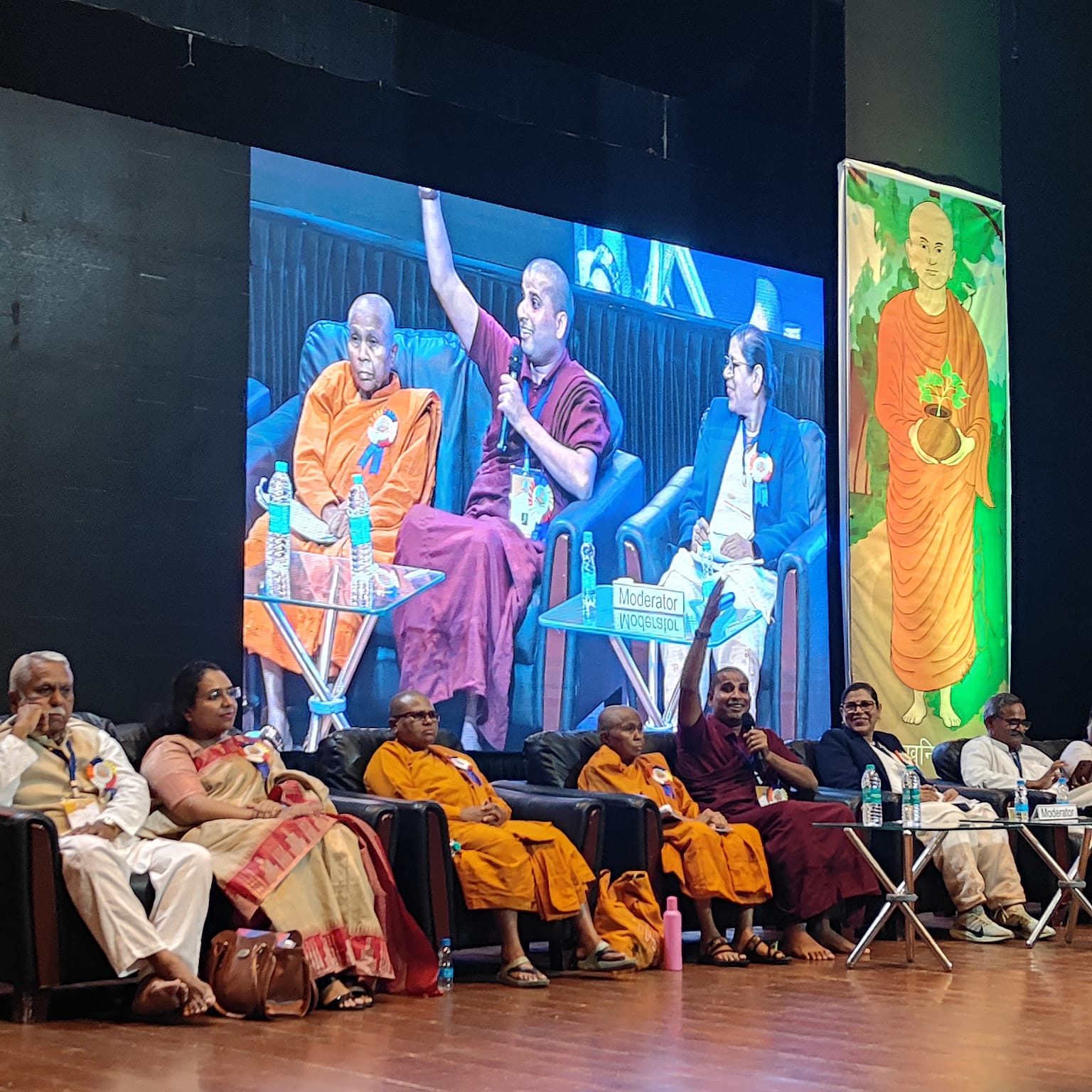
The event from 29–30 September marked a sincere effort to bring bhikkhunis and laypeople from all over India. With all four pillars of the sangha together, bhikkhunis were encouraged to express their views, discuss the teachings of the Buddha, and reaffirm the duties and responsibilities of Ambedkarite nuns, monks, laywomen, and laymen. The celebration was an inspiration for the entire Fourfold Sangha, but especially the bhikkhunis.
Topics and Themes
Day 1
1st session: The history of Bhikkhuni Sangha activities in modern India and other Buddhist countries
Panellists for this session were Mari Metso from Finland, Ven. Dhammavinaya Bhikkhuni from Haryana, Ven. Bouddha Maurya Bhikkhu from Tamil Nadu, Ven. Sanghamitra Bhikkhuni from Mumbai, and Moderator Ven. Nimmal Metta Bhikkhuni from Uttar Pradesh.
Some common views reflected from the session: all the bhikkhunis faced problems while ordaining (pabbaja). They did not get opportunity to talk about their problems and their work. They praised the Buddha and Babasaheb for promoting equality. Despite diverse problems, Buddhism in Finland and Tamil Nadu is doing well.
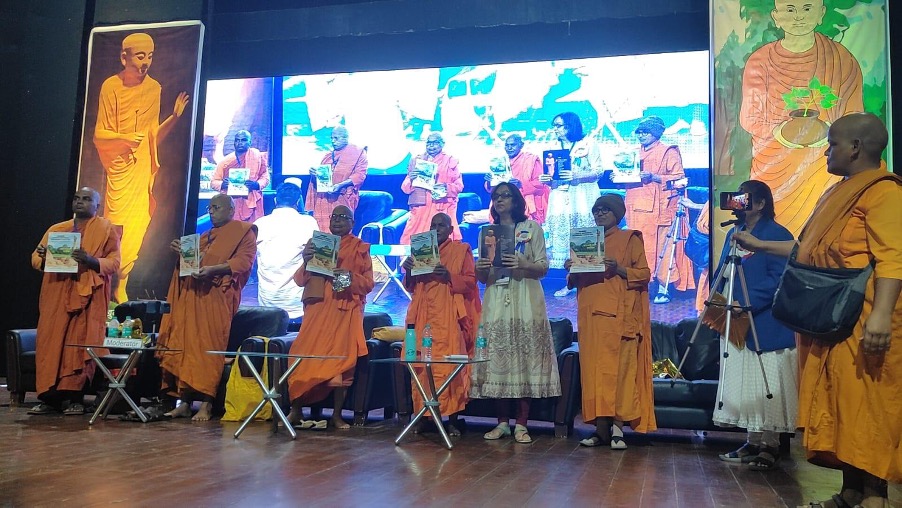
2nd session: The perspective of the sangha sasana towards the development of bhikkhuni Sangha and the struggle of the bhikkhuni sangha in facing patriarchy
Panellists were Ven. Pannyasilo Bhikkhu from Madhya Pradesh and Ven. Dhammavinaya from Haryana. The session was moderated by Ven. Vijaya Maitriya.
The discussion in this panel analysed the status of the bhikkhuni sangha in countries where the Buddhism has a position (or a potential one) within the government. The consensus of the speakers was that even if the sangha got close to the government, the bhikkhuni sangha would not be given importance or outright neglected.
3rd session: The role of Mahayana bhikkhunis in keeping alive the bhikkhuni lineage
Panellists for this session were Rajaram Patil and Dr. Saroj Dange. It was moderated by Dr. Ven. Suniti Bhikkhuni. The history of the Mahayana nuns’ sangha was discussed along with the existence of bhikkhunis in other countries. The educational institutions run by Mahayana Bhikkhunis play an important role in keeping the women’s sangha alive in the world. In different parts of India, we find women were historically more powerful because of the nunneries’ presence. The real identities of bhikkhunis were replaced by Hindu goddesses, or disguised as local deities.
4th session: Open floor
Panellists were Ven. Sanghamitra Bhikkhuni from Nagpur, Ven. Sanghaamitra from Aurangabad, and Ven. Thulnanda Bhikkhuni. Moderated by Ven. Sumedha Bhikkhuni.
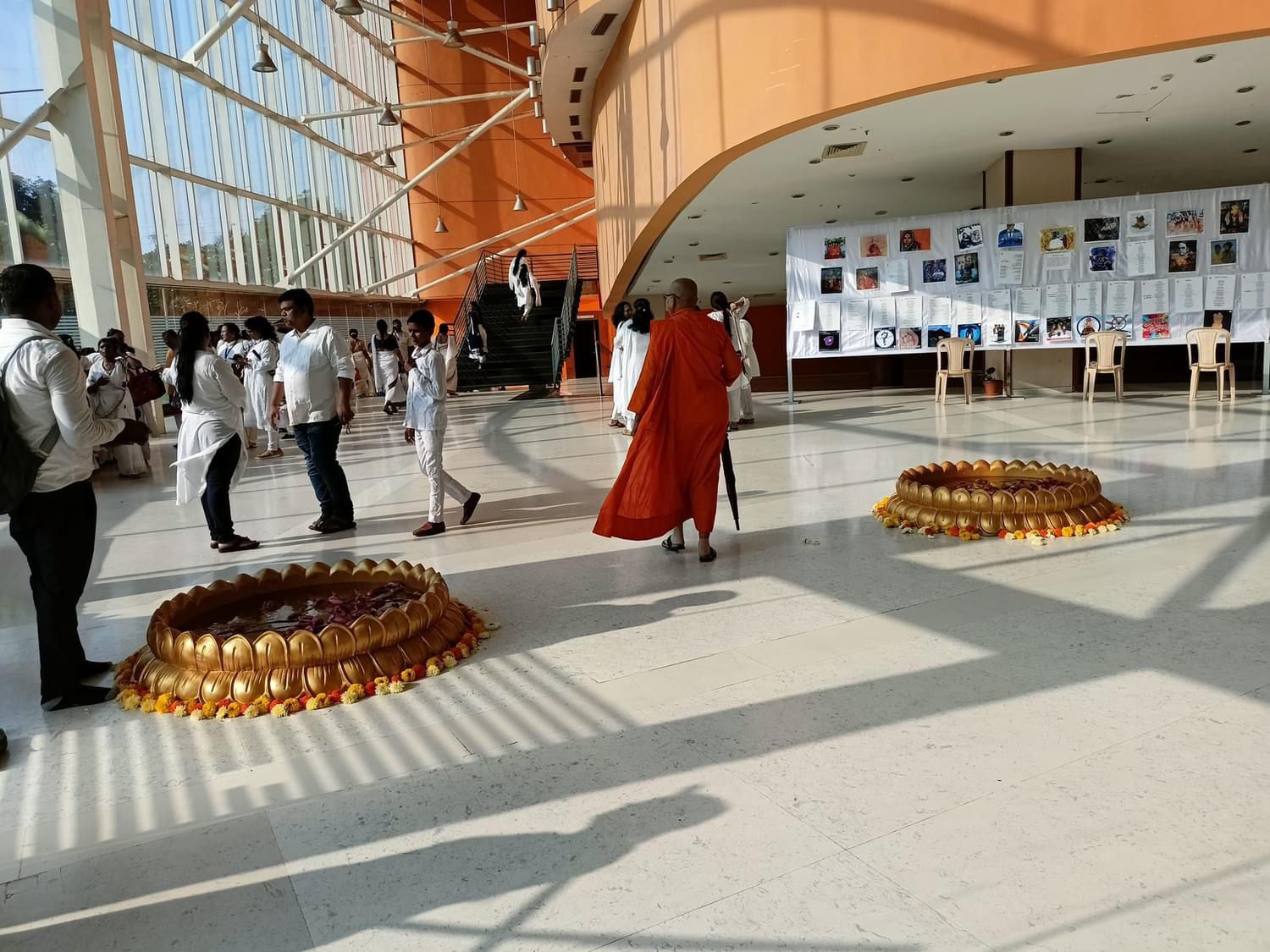
The nuns expressed their joy for being a part of International Bhikkhuni Sangha Day 2023. They also discussed the present activities, with critique aimed at the pedagogical methods of certain bhikkhuni communities.
Day 2
1st session: Gender discrimination in Pali text – bhikkhuni perspective towards Global Peace and Violence against Women
Speakers were Shankar Bhalshankar, Dr. Sanjay Khobragade, and Ven. Rupananda Bhikkhuni from Mumbai. Moderated by Ven. Vijaya Maitriya Bhikkhuni.
Gender discrimination dates back to the Vinaya Pitaka. Gender rules were laid down during the First Council led by Reverend Mahakassapa. Gender discrimination is practiced in other Buddhist countries like Sri Lanka, Thailand, and Myanmar.
2nd session: Structural Ideas, Experience and Barriers for the Co-ordination between the Bhikkhuni Sangha of India and other Countries
Speakers were Dr. Saroj Aglave, Ven. Anand Bhikkhu and Ven. Dhammadina Bhikkhuni. Moderated by Ven. Suniti.
This discussion was about how international relations developed through Buddhist universities like Nalanda and Gunsiri, and through monks and nuns like Sanghamitta and Mahinda. The bhikkhunis of many Buddhist countries, mainly Mahayana nuns, and members of groups like Alliance of Bhikkhunis and Sakyadhita are coming together and organising global conferences.
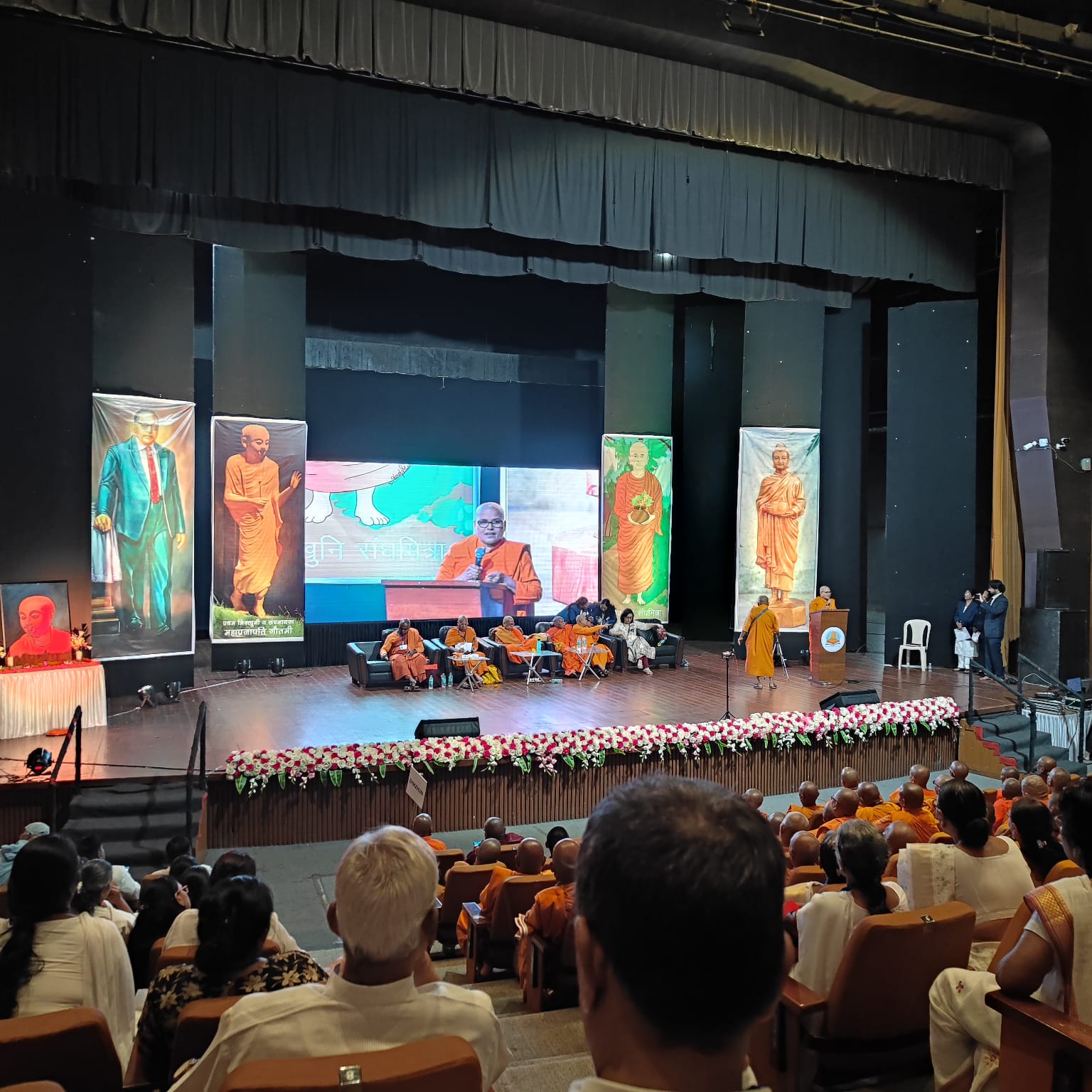
Ven. Ayya Yeshe bhikkhuni and Ven. Karma Lekshe Tsomo had sent their videos and papers respectively to be presented. Ven. Karma Lekshe Tsomo from the US could not come due to health reasons, so she had sent a paper to be read in the conference. Similarly, videos with presentations and best wishes were sent by Bhikkhuni Ayya Yeshe from Australia, research scholar Harsha Gautam, from Texas University, and journalist Raymond Lam from Buddhistdoor Global.
The need for seminaries to educate and train nuns in India was raised, with an eye to building relations between the sangha of India with the sanghas of other Buddhist countries.
3rd session: The role of monks and nuns amidst constant change, and the role of laypeople in working with the nuns’ community
Speakers were Ven. Mahamaya Bhikkhuni, Ven.Vinayacharya Bhikkhu, Ashok Sarasvati Acharya Salve, and Namrata Gaikwad. Moderators were Usha Bouddha and Sudha Mohile.
Injustice towards women and nuns specifically was a matter of concern. Bhikkhus need to work for the justice for women, as Mahaprajapati Gautami resides in every woman. Women know the problems of society, so they have to change their strategies to make people aware of Buddhist education. Women, monastic and lay alike, are silent, and their pain needs to be addressed.
The laity need to acknowledge their duties towards bhikkhunis, and take care of their health, physical safety, and so on.
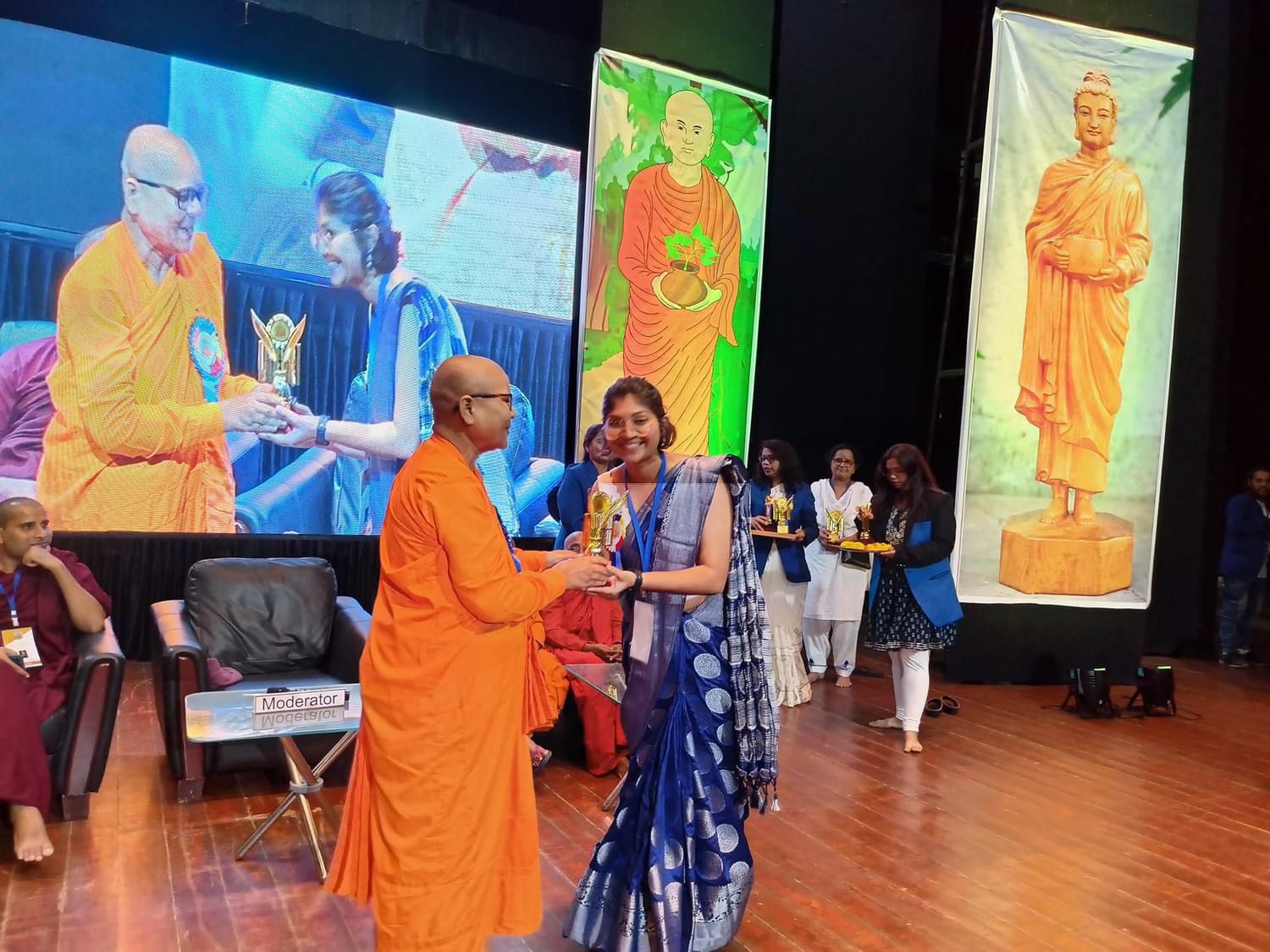
Valedictory session
Speakers were Ven. Sumedha Bhikkhuni, Ven. Prajapati Bhikkhuni, Ven. Vinayacharya Bhikkhu, Roshna Borkar, Shashank Kamble, and Bhante Suniti Bhikkhuni.
On behalf of the whole event, Namrata Gaikwad paid tribute to Ven. Ven. Sasana Dipika Khanti Khema Bhikkhuni from America, who had passed away on 21 September 2023.
Between the sessions, cultural programs were scheduled by the cultural team. Mayura Saavi and Pratiksha Sonavane performed audio narration storytelling, recounting the first upasampada of Mahaprajapati along with 500 followers. Rekha Kamble and her team performed a play presenting the lives of bhikkhunis at the time of Buddha. Many upasikas and bhikkhunis sang motivational songs about the Buddha and Dr. Ambedkar.
A team led by anchors Mayura Savi, Dr. Harshada Jadhav, Anita Kamble, Kshama Patil, and Dr. Revat Kaninde kept the audience enthralled with their presentations.
The function ended with a vote of thanks to all organizers and attendees. The action plan committee and supporters were given mementoes for this historic celebration. The volunteers who took care of the bhikkhunis were given T-shirts with the tagline:
BHIKKHUNI – A Journey of Transformation from Womanhood to SENTIENT BEING.


